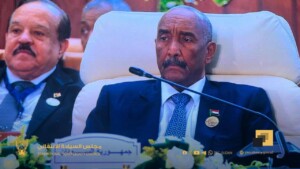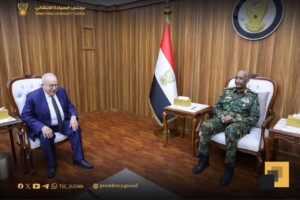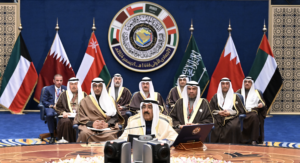Cabinet reshuffle: Six Sudanese ministers resign, one dismissed
Prime Minister Abdallah Hamdok dismissed Minister of Health Akram El Tom and accepted the resignation of six other ministers yesterday as part of a cabinet reshuffle.
 Prime Minister Abdallah Hamdok (SUNA)
Prime Minister Abdallah Hamdok (SUNA)
Prime Minister Abdallah Hamdok dismissed Minister of Health Akram El Tom and accepted the resignation of six other ministers yesterday as part of a cabinet reshuffle. The signing of the final peace accord between the Sudanese government and most of the rebel movements in the country is scheduled to take place in Juba next week.
The replacement of ministers was agreed upon during the peace negotiations between the Sudanese government and the rebel movements. It also is a response to the people who took to the streets of Sudan on June 30, calling for corrections of the course of the uprising.
Ministers Asmaa Abdallah (Foreign Affairs), Ibrahim El Badawi (Finance and Economic Planning), Adil Ibrahim (Energy and Mining), Eisa Osman (Agriculture and Natural Resources), Hashim Tahir (Transport and Infrastructure), and Alameldin Abdallah (Animal Wealth) submitted their resignations at the cabinet meeting yesterday.
Hamdok tasked seven officials to temporarily replace the posts until new ministers will be appointed (after the signing of the Juba peace agreement): Omar Gamareldin (Foreign Affairs), Heba Mohamed Ali (Finance), Sara Abdelazeem (Health), Kheiri Abdelrahman (Energy and Mining), Abdelgadir Turkawi (Agriculture and Natural Resources), Hashim Ibn Auf (Transport and Infrastructure), and Adil Idris (Animal Wealth).
The PM said that the decision to replace seven ministers “came after a thorough and accurate evaluation of the performance of the executive body, in order to implement the tasks of the transitional period and respond to the rapid economic and social changes”.
“The trust that the people have in the transitional government obliges us to listen to the voices of the streets, the demands of the revolutionaries, and to think well. We will proceed united towards the best way to achieve their demands, and implement the brave slogan of the revolution ‘Freedom, Peace, and Justice’,” he stated.
“Careful and strict evaluation of the performances of all those who carried the trust of the people in the transitional government is a duty,” Hamdok added. He emphasised that the evaluation will continue “to develop our services to the people and achieve the goals of the revolution”.
Women
The No Oppression against Women Initiative commented that the representation of women within state institutions and at decision-making positions is still weak and unsatisfactory, despite the wide participation of women in the revolution.
The Initiative said in a message to PM Hamdok and the Forces for Freedom and Change (FFC) that “your decision to form a national committee to cooperate with the new United Nations mission was disappointing for the Sudanese women, as were all previous appointments”. The Initiative blamed Hamdok’s government for “the continuation of the same kind of rule that the ousted regime of Omar Al Bashir practised, with no commitment to the Declaration of Freedom and Change, and a delay in dealing with the Constitutional Declaration”.
The women activists will continue to cooperate “with the living forces of the Revolution to correct its course , and to support the transitional government to accomplish the goals of the Revolution”.
Peace agreement
A comprehensive peace agreement with the two factions of the Sudan Revolutionary Front rebel alliance will be signed in Juba on July 16.
The Sudanese government and the armed movements have reached an agreement on high-level power-sharing issues. A military delegation has gone to Juba to complete the security arrangements file.
According to informed sources, the two parties agreed to allocate 75 seats in the transitional Legislative Council to the rebel movements, and extend the 39-month transitional period. It is to start again on the date that the Comprehensive Peace Agreement will be signed.
Reportedly, the parties also agreed to exclude members of the armed movements from Article 20 of the Constitutional Declaration, that prevents members of the Sovereign Council and the Cabinet, and state governors from running in the elections, unless they resign six months before the end of the transitional period.
The two parties agreed to add three seats to the Sovereign Council, to be occupied by rebel leaders that sign the peace agreement. Four federal ministries are reserved for the rebel leaders as well.
At the regional level, 40 percent of the government of Darfur is allocated to members of the rebel movements, 40 percent to the transitional government, and 20 percent to local stakeholders. The Two Areas (South Kordofan and Blue Nile state) will be ruled autonomously.
The armed movements will obtain 10 per cent of the state government seats in Northern State, River Nile state, El Gezira, Sennar, and White Nile state.
Radio Dabanga’s editorial independence means that we can continue to provide factual updates about political developments to Sudanese and international actors, educate people about how to avoid outbreaks of infectious diseases, and provide a window to the world for those in all corners of Sudan. Support Radio Dabanga for as little as €2.50, the equivalent of a cup of coffee.












 and then
and then